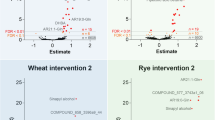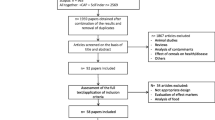Abstract
Purpose
Whole-grain intake assessed through self-reported methods has been suggested to be inversely associated with the metabolic syndrome (MetS) risk in epidemiological studies. However, few studies have evaluated the association between whole-grain intake and MetS risk using objective biomarkers of whole-grain intake. The aim of this study was to examine the association between plasma 3-(3,5-Dihydroxyphenyl)-1-propanoic acid (DHPPA), a biomarker of whole-grain wheat and rye intake, and MetS risk in a Chinese population.
Methods
A case–control study of 667 MetS cases and 667 matched controls was conducted based on baseline data of the Tongji-Ezhou Cohort study. Plasma DHPPA concentrations were assessed by high-performance liquid chromatography–tandem mass spectrometry. The MetS was defined based on criteria set by the Joint Interim Statement.
Results
Plasma DHPPA was inversely associated with MetS risk. After adjustment for age, sex, body mass index, smoking status, alcohol drinking status, physical activity and education level, the odds ratios (ORs) for MetS across increasing quartiles of plasma DHPPA concentrations were 1 (referent), 0.86 (0.58–1.26), 0.77 (0.52–1.15), and 0.59 (0.39–0.89), respectively. In addition, the cubic spline analysis revealed a potential nonlinear association between plasma DHPPA and MetS, with a steep reduction in the risk at the lower range of plasma DHPPA concentration.
Conclusion
Our study revealed that individuals with higher DHPPA concentrations in plasma had lower odds of MetS compared to those with lower DHPPA concentrations in plasma. Our findings provided further evidence to support health benefits of whole grain consumption.

Similar content being viewed by others
Availability of data and materials
The datasets used and/or analyzed during the current study are available from the corresponding author on reasonable request.
Code availability
Not applicable.
Abbreviations
- BMI:
-
Body mass index
- CI:
-
Confidence interval
- DHBA:
-
3,5-Dihydroxybenozoic acid
- DHPPA:
-
3-(3,5-Dihydroxyphenyl)-1-propanoic acid
- FFQ:
-
Food frequency questionnaire
- HDL-C:
-
High-density lipoprotein cholesterol
- LC–MS/MS:
-
High-performance liquid chromatography-tandem mass spectroscopy
- LDL-C:
-
Low-density lipoprotein cholesterol
- MetS:
-
Metabolic syndrome
- OR:
-
Odds ratio
- TJEZ:
-
Tongji–Ezhou
References
Lu J, Wang L, Li M et al (2017) Metabolic syndrome among adults in China: the 2010 China noncommunicable disease surveillance. J Clin Endocrinol Metab 102:507–515
Lusis AJ, Attie AD, Reue K (2008) Metabolic syndrome: from epidemiology to systems biology. Nat Rev Genet 9:819–830
Wilson PW, D’Agostino RB, Parise H et al (2005) Metabolic syndrome as a precursor of cardiovascular disease and type 2 diabetes mellitus. Circulation 112:3066–3072
O’Neill S, O’Driscoll L (2015) Metabolic syndrome: a closer look at the growing epidemic and its associated pathologies. Obes Rev 16:1–12
Fardet A (2010) New hypotheses for the health-protective mechanisms of whole-grain cereals: what is beyond fibre? Nutr Res Rev 23:65–134
Malin SK, Kullman EL, Scelsi AR et al (2018) A whole-grain diet reduces peripheral insulin resistance and improves glucose kinetics in obese adults: a randomized-controlled trial. Metabolism 82:111–117
Zhou AL, Hergert N, Rompato G et al (2015) Whole grain oats improve insulin sensitivity and plasma cholesterol profile and modify gut microbiota composition in C57BL/6J mice. J Nutr 145:222–230
Hollaender PL, Ross AB, Kristensen M (2015) Whole-grain and blood lipid changes in apparently healthy adults: a systematic review and meta-analysis of randomized controlled studies. Am J Clin Nutr 102:556–572
Harris Jackson K, West SG, Vanden Heuvel JP et al (2014) Effects of whole and refined grains in a weight-loss diet on markers of metabolic syndrome in individuals with increased waist circumference: a randomized controlled-feeding trial. Am J Clin Nutr 100:577–586
Newby PK, Maras J, Bakun P et al (2007) Intake of whole grains, refined grains, and cereal fiber measured with 7-d diet records and associations with risk factors for chronic disease. Am J Clin Nutr 86:1745–1753
Aune D, Norat T, Romundstad P et al (2013) Whole grain and refined grain consumption and the risk of type 2 diabetes: a systematic review and dose-response meta-analysis of cohort studies. Eur J Epidemiol 28:845–858
Juan J, Liu G, Willett WC et al (2017) Whole grain consumption and risk of ischemic stroke: results from 2 prospective cohort studies. Stroke 48:3203–3209
Westerterp KR, Goris AH (2002) Validity of the assessment of dietary intake: problems of misreporting. Curr Opin Clin Nutr Metab Care 5:489–493
van Dam RM, Hu FB (2008) Are alkylresorcinols accurate biomarkers for whole grain intake? Am J Clin Nutr 87:797–798
Ross AB, Kamal-Eldin A, Aman P (2004) Dietary alkylresorcinols: absorption, bioactivities, and possible use as biomarkers of whole-grain wheat- and rye-rich foods. Nutr Rev 62:81–95
Linko-Parvinen AM, Landberg R, Tikkanen MJ et al (2007) Alkylresorcinols from whole-grain wheat and rye are transported in human plasma lipoproteins. J Nutr 137:1137–1142
Koskela A, Samaletdin A, Aubertin-Leheudre M et al (2008) Quantification of alkylresorcinol metabolites in plasma by high-performance liquid chromatography with coulometric electrode array detection. J Agric Food Chem 56:7678–7681
Drake I, Sonestedt E, Gullberg B et al (2014) Plasma alkylresorcinol metabolites as biomarkers for whole-grain intake and their association with prostate cancer: a Swedish nested case-control study. Cancer Epidemiol Biomarkers Prev 23:73–83
Sun T, Rong Y, Hu X et al (2018) Plasma alkylresorcinol metabolite, a biomarker of whole-grain wheat and rye intake, and risk of type 2 diabetes and impaired glucose regulation in a Chinese population. Diabetes Care 41:440–445
Sun T, Zhang Y, Huang H et al (2019) Plasma alkylresorcinol metabolite, a biomarker of whole-grain wheat and rye intake, and risk of ischemic stroke: a case-control study. Am J Clin Nutr 109:1–7
Aubertin-Leheudre M, Koskela A, Samaletdin A et al (2010) Responsiveness of urinary and plasma alkylresorcinol metabolites to rye intake in finnish women. Cancers 2:513–522
Aubertin-Leheudre M, Koskela A, Samaletdin A et al (2010) Plasma alkylresorcinol metabolites as potential biomarkers of whole-grain wheat and rye cereal fibre intakes in women. Br J Nutr 103:339–343
Soderholm PP, Koskela AH, Lundin JE et al (2009) Plasma pharmacokinetics of alkylresorcinol metabolites: new candidate biomarkers for whole-grain rye and wheat intake. Am J Clin Nutr 90:1167–1171
Alberti KG, Eckel RH, Grundy SM et al (2009) Harmonizing the metabolic syndrome: a joint interim statement of the International diabetes federation task force on epidemiology and prevention; National heart, lung, and blood institute; American heart association; World heart federation; International atherosclerosis society; and international association for the study of obesity. Circulation 120:1640–1645
Grundy SM, Cleeman JI, Daniels SR et al (2005) Diagnosis and management of the metabolic syndrome: an American heart association/national heart, lung, and blood institute scientific statement. Circulation 112:2735–2752
McKeown NM, Meigs JB, Liu S et al (2004) Carbohydrate nutrition, insulin resistance, and the prevalence of the metabolic syndrome in the Framingham offspring cohort. Diabetes Care 27:538–546
Huang L, Wang H, Wang Z et al (2019) Regional disparities in the association between cereal consumption and metabolic syndrome: results from the China health and nutrition survey. Nutrients 11:764
Esmaillzadeh A, Mirmiran P, Azizi F (2005) Whole-grain consumption and the metabolic syndrome: a favorable association in Tehranian adults. Eur J Clin Nutr 59:353–362
Sahyoun NR, Jacques PF, Zhang XL et al (2006) Whole-grain intake is inversely associated with the metabolic syndrome and mortality in older adults. Am J Clin Nutr 83:124–131
Lutsey PL, Steffen LM, Stevens J (2008) Dietary intake and the development of the metabolic syndrome: the Atherosclerosis risk in communities study. Circulation 117:754–761
Burgess-Champoux TL, Larson NI, Neumark-Sztainer DR et al (2010) Longitudinal and secular trends in adolescent whole-grain consumption, 1999–2004. Am J Clin Nutr 91:154–159
Meharg AA, Lombi E, Williams PN et al (2008) Speciation and localization of arsenic in white and brown rice grains. Environ Sci Technol 42:1051–1057
Johnsen NF, Frederiksen K, Christensen J et al (2015) Whole-grain products and whole-grain types are associated with lower all-cause and cause-specific mortality in the Scandinavian HELGA cohort. Br J Nutr 114:608–623
Kyro C, Skeie G, Loft S et al (2013) Intake of whole grains from different cereal and food sources and incidence of colorectal cancer in the Scandinavian HELGA cohort. Cancer Causes Control 24:1363–1374
Kyro C, Skeie G, Dragsted LO et al (2011) Intake of whole grains in Scandinavia is associated with healthy lifestyle, socio-economic and dietary factors. Public Health Nutr 14:1787–1795
Barbagallo M, Dominguez LJ, Galioto A et al (2003) Role of magnesium in insulin action, diabetes and cardio-metabolic syndrome X. Mol Aspects Med 24:39–52
Waniek S, di Giuseppe R, Plachta-Danielzik S et al (2017) Association of vitamin E Levels with metabolic syndrome, and MRI-derived body fat volumes and liver fat content. Nutrients 9:1143
Ley SH, Hanley AJ, Sermer M et al (2013) Lower dietary vitamin E intake during the second trimester is associated with insulin resistance and hyperglycemia later in pregnancy. Eur J Clin Nutr 67:1154–1156
Sun K, Su T, Li M et al (2014) Serum potassium level is associated with metabolic syndrome: a population-based study. Clin Nutr 33:521–527
Tal B, Sack J, Yaron M et al (2019) Increment in dietary potassium predicts weight loss in the treatment of the metabolic syndrome. Nutrients 11:1256
Roager HM, Vogt JK, Kristensen M et al (2019) Whole grain-rich diet reduces body weight and systemic low-grade inflammation without inducing major changes of the gut microbiome: a randomised cross-over trial. Gut 68:83–93
Murtaza N, Baboota RK, Jagtap S et al (2014) Finger millet bran supplementation alleviates obesity-induced oxidative stress, inflammation and gut microbial derangements in high-fat diet-fed mice. Br J Nutr 112:1447–1458
Aune D, Keum N, Giovannucci E et al (2016) Whole grain consumption and risk of cardiovascular disease, cancer, and all cause and cause specific mortality: systematic review and dose-response meta-analysis of prospective studies. BMJ 353:i2716
Acknowledgements
The chief acknowledgement is to the staff based in the involved hospital and the Echeng Steel corporation for assisting with the fieldwork.
Funding
This work was funded by the National Natural Science Foundation of China (81773423), the National Natural Science Foundation of China (81903312), the Major International (Regional) Joint Research Project (NSFC 81820108027), the National Key Research and Development Program of China (2017YFC1600500), the Special Funds of the National Natural Science Foundation of China (81941016). The funding sources had no role in the design and conduct of the study; collection, management, analysis, and interpretation of the data; preparation, review, or approval of the manuscript; or decision to submit the manuscript for publication.
Author information
Authors and Affiliations
Contributions
ZL, TS, and LL: designed the study. ZL: analyzed the data and wrote the manuscript. SH, SR, XM, QW, JY, XP, and XL: conducted the experiments and performed the data collection. LC, ZS, and GL: commented on drafts and edited the manuscript. LL and TS had full access to all the data in the study and take responsibility for the integrity of the data and the accuracy of the data analysis. All authors read and approved the final manuscript.
Corresponding authors
Ethics declarations
Conflict of interests
The authors declare that they have no competing interests.
Ethics approval
Approval of the Ethics and Human Subject Committee of Tongji Medical College was obtained before the start of the work.
Consent to participate
All the participants gave written, informed consent to participate in the study.
Consent for publication
Not applicable.
Supplementary Information
Below is the link to the electronic supplementary material.
Rights and permissions
About this article
Cite this article
Zhou, L., Hu, S., Rong, S. et al. DHPPA, a major plasma alkylresorcinol metabolite reflecting whole-grain wheat and rye intake, and risk of metabolic syndrome: a case–control study. Eur J Nutr 61, 3247–3254 (2022). https://doi.org/10.1007/s00394-022-02880-5
Received:
Accepted:
Published:
Issue Date:
DOI: https://doi.org/10.1007/s00394-022-02880-5




